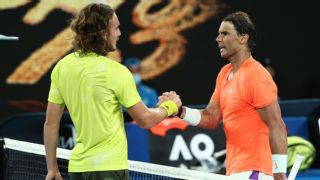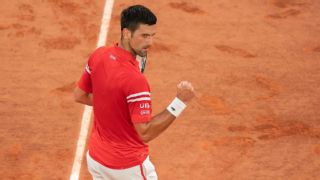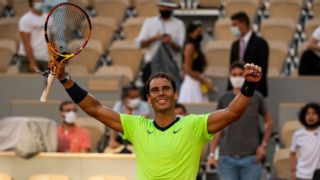|
Friday's French Open men's semifinals are evenly split between the new and old guard: On one side, two fast-rising youngsters try to solidify their claim as the future face of the sport; on the other, a pair of no-doubt legends battle it out with history on the line. While some tennis observers feel we are seeing a Novak Djokovic-Rafael Nadal match a round too early because French Open organizers used rankings for the tournament's seedings, placing the two on the same side of the draw, it may be an advantage for Alexander Zverev or Stefanos Tsitsipas in the final. "The good news for [Zverev or Tsitsipas], and this goes back to my issue with the seedings, they've only got to beat one of these guys," ESPN's Patrick McEnroe said. "The truth is, they should have to beat two to win one of these [majors]. And in this case, I thought that the French made a huge mistake by not altering the seedings." Ahead of the semifinals, we asked our tennis experts about these star-powered matchups, what's at stake and who has the best chance on clay. What about Zverev's and Tsitsipas' games has surprised you most so far?Chris Evert: Tsits has impressed me with his confidence and composure. He's shown no or little nerves, is hungry and has confidence since he was within a point of beating Nadal in Barcelona and serving for the match against Novak in Rome. Zverev has impressed me with his power -- his serve and forehand -- and his consistency. Patrick McEnroe: Well, I think nothing surprised me about Tsitsipas' game because he's been rock-solid this entire clay-court season. Obviously, he had a great Australian Open too, beating Nadal the way he did in five, so I think he's a very natural player on clay. He's very athletic, he has a lot of different shots, he can come forward, he's a great mover -- I think that's the edge he has against Zverev in this matchup. He moves a little bit better, defends the court a little bit better; in my opinion at least on this surface he's more versatile. What I've been impressed with maybe more than anything is just his demeanor -- he's been very positive, very workmanlike, he's been taking care of his matches pretty easily for the most part. I like his chances a lot. Zverev, he's had his issues with his serve, so I think the biggest pleasant surprise for him has been how well he's served throughout the tournament. In a way, I think, being under the radar has helped him because there hasn't been the same kind of pressure on him. He's looked really good. The only advantage he has against Tsitsipas is he's got a little bit more firepower, but I think the surface that is probably the worst for him in this matchup would be a clay court -- on a faster hard court I think he could hit through Tsitsipas a little bit more, but I don't think he could do that on this type of surface. Bill Connelly: With Tsitsipas, not much. He's been very good on clay for a while -- third best in the world most likely -- so it was easy to figure he'd be a favorite to reach the semis. The fact that he swept through both [Daniil] Medvedev and [Pablo] Carreno Busta without dropping a set was awfully impressive, though. He's incredibly confident right now. Zverev, on the other hand, had been a little more inconsistent, winning Madrid but suffering upsets at Munich and Monte Carlo. He has gotten better in every single match in this tournament -- he went from dropping two sets to one qualifier in the first round and going to two tiebreakers with another in the second, to winning six of his last nine sets 6-2 or worse. This is the best he's ever played at Roland Garros. D'Arcy Maine: Zverev lost the first two sets of his opening-round match against Oscar Otte, a qualifier, and looked like he was nearing a devastatingly early exit from Roland Garros. It wasn't the comeback victory itself that was a surprise; it was the way he did it. He won 18 of the next 22 games and closed out the match with a bagel in the fifth set. It was incredible resolve by someone not always known for his on-court mental maturity -- and who has admitted he often puts too much pressure on himself at majors. He hasn't dropped a set since and has been firmly in control of his matches and his emotions during his run to the semis. For Tsitsipas, it's been his consistent level of play throughout. He came to Paris having won titles in Monte Carlo and Lyon, and he simply has not let up. Even against Daniil Medvedev, the world No. 2 who owned a career record of 6-1 over him entering the match, Tsitsipas dominated from the start. Sure, Medvedev isn't known for his prowess on clay, but even still, Tsitsipas was never flustered against one of the best players on tour. He lost just four points on serve in the first set and had an answer for everything Medvedev tried. Even during the competitive second set, he saved two set points and easily won the tiebreak. His confidence and ease on court have increased with every match. Simon Cambers: I've been impressed by Tsitsipas, in particular, and his ability to stay focused, even in difficult situations like playing the night session with no fans. He stayed calm against Medvedev, a player he's struggled with a lot, and looks very strong, his game perfect for clay. Zverev showed a lot of resilience in his matches early on and since has really started to play well. Should be a cracking semifinal. Who has a better shot of defeating Nadal or Djokovic in the final: Zverev or Tsitsipas?McEnroe: I definitely think Tsitsipas has the better shot, again because of the things I mentioned. I think he's just more versatile, he can play slice, he can come to the net -- he's much better at the net than Zverev. He plays a little bit more margin on his shots. I just think he, on this surface, has a much better shot against either one of those guys going into the final. He's played a lot of matches on clay this year, he's won a big tournament, played an epic match with Nadal in Barcelona, so I think even going up against Nadal, who you would expect to be in the final, I think he has a better chance because of his versatility on the surface. And also, he's extremely fit, so to be able to go up against either one of those guys in the final, you've got to be able to play at an extremely high level for far more than an hour and a half or two hours; you've got to do it for arguably three and a half, four hours to beat those guys. Evert: Tsitsipas can hurt either one because he has belief, almost beat Novak and Nadal a few weeks back on clay and handled Medvedev even though he was 1-6 in matches against him. Connelly: Tsitsipas. Zverev has won three of the last four against Nadal, and one was even on clay, but I trust Tsitsipas' consistency more, and we saw at the Australian Open that he can go deep into a fifth set with Nadal and still play well. If they were to face Djokovic, well, neither has played Djokovic all that well of late, but give me Tsitsipas anyway because he grades out better on clay on average.  Maine: It will be very much an uphill battle for either of these players against Nadal or Djokovic in a major final, but that said, it has to be Tsitsipas. Yes, Zverev has the invaluable experience of having played in a Grand Slam final, but Tsitsipas comes into the semifinal riding a nine-match winning streak and knowing he can compete with the very best. He played a highly competitive match against Nadal in the Barcelona final in April and beat him in a five-setter at the Australian Open. While clay is an entirely different scenario when it comes to Nadal, Tsitsipas lost the first two sets during their quarterfinal clash in Melbourne and came back for the victory. He knows he can beat Nadal in a marathon match, and that confidence might make all the difference. And, as he forced a decider against Djokovic after losing the first two sets in their 2020 semifinal clash at the French Open and has only gotten significantly better on clay since, Tsitsipas would have to be feeling pretty good about his chances in that matchup as well. Cambers: I'd say Tsitsipas. I know Zverev beat Nadal in Madrid, but the altitude was a big factor there, and that defeat would just make Nadal more aware of what he needs to do. Tsitsipas' game stacks up a little better against Nadal, and he beat him from two sets down in Australia, which will give him a lot of belief. Both Tsitsipas and Zverev have beaten Djokovic too, but in a final, not sure they'd manage it. How can Djokovic beat Nadal on clay?Evert: Novak has to be patient, focused and his serve plus one has to be on for him to win. I give him a 40% chance -- Nadal has to be a little off that day. McEnroe: Well, what is this, the 58th meeting? So there's not that many surprises between these two guys. They know each other inside and out. Obviously, clay just favors Nadal because of his excessive topspin, particularly off the forehand side. So he's able to use that to his advantage on this surface, whereas on a faster court, it's more to Djokovic's advantage. So for Novak, a couple things: He's gotta get on top of the rally early, and that means I think getting a high percentage of first serves in and serving well so that he can get on top of the point early. And he's got to play close to or inside the baseline a lot more than Nadal does, because Nadal is much more comfortable really anywhere on clay, but he's really comfortable playing defensive tennis. Djokovic has to take offense as often as he can, which is difficult to do on clay, particularly with the spin of Nadal, which is why Nadal's going for his 14th major. So I think that I certainly give the edge to Rafa because of all that, but Novak's had a great clay-court season too, and he played Rafa very close in Rome and had a chance in the third set to win it. So he's gotta be 100 percent -- mentally, physically, emotionally. Whereas on a hard court or on grass, it's a reverse. This surface just favors Nadal more than it does Djokovic. Everything has to go right for him. Play offensive when he can, take the ball inside the baseline when he can and physically be ready to go to the wall because that's the only way he's going to be able to beat Nadal on this surface in a best of five.  Connelly: Start by actually serving well. When Djokovic has gotten the better of Nadal on clay, he's been winning 65% or more of his first-serve points and 55% or more of his second-serve points. Last fall in the French Open final, those numbers were 50% and 48%, respectively. Nadal's own serve has been a bit inconsistent in his last couple of matches, but if he can create steady break opportunities, that won't matter all that much. Maine: A balanced breakfast, a positive attitude and a lot of prayer? All jokes aside, Djokovic is one of just two (!) men who have beaten Nadal in Paris, so he knows it is possible. While Nadal was by no means at his best in 2015, Djokovic pulled off the victory by using as much variety as possible and avoiding the longer rallies. Djokovic said he would look to that match ahead of their meeting in the 2020 final, and while that didn't work out so well, it still could be valuable this time around. What he can't do is have a slow start like he did in his fourth-round match against Lorenzo Musetti. It's one thing against a 19-year-old playing in his first Grand Slam; it's another against the King of Clay. While Djokovic said he enjoyed being two sets down to Musetti, if he were to fall into that trap with Nadal, it would likely end up like last year's lopsided final in which Nadal won in straights. Cambers: He's done it before, so he knows it can be done, which is a good start. He needs to serve well, be aggressive and utilize the same game plan that has worked in the past, attack the Nadal backhand down the line and then use the backhand crosscourt, on the angle, to attack. But he pretty much has to play perfectly and can't have any lapses. Whose legacy would another trip to the final and potential title help more: Djokovic's or Nadal's?Evert: It would help Nadal's legacy more: 14 French Opens and pass Roger Federer for a record 21 (in men's!) Grand Slams. McEnroe: That's a great question. I don't think it's about getting to a final for them. In a way, this obviously feels like a final and it should be the final, which is part of the reason I said they should have seeded Nadal 1 or 2, which I thought was a huge mistake, even though the French always goes with the rankings for their seedings. But I think that was a mistake; this should be the final, and if one of those guys could have knocked them off in the semis -- be it Tsitsipas or Zverev -- more power to them. But as far as the question, I think it's more important for Nadal because he could overtake Federer. So if he gets this title, he's at 21, and unless Federer finds the fountain of youth at Wimbledon, he's never gonna look back at him. They'll never be tied again. I don't see Roger winning another major other than Wimbledon moving forward. So obviously for Novak to get to 19 would obviously be huge, but if Nadal finally passes Federer, that's a much bigger milestone.  Connelly: If Nadal is going to end up ahead of Djokovic in the all-time major titles race, you figure he needs this one more. With 18, Djokovic is only two behind Nadal and Roger Federer, and excluding disqualifications, he's won four of the last five hard-court majors. That said, Djokovic could become the only person to beat Nadal twice at Roland Garros, and he would be the favorite to become the first person, besides Nadal, to win a second French Open title since Gustavo Kuerten. That's certainly legacy stuff right there. Cambers: Good question. Djokovic would then have won each Grand Slam twice, which would be remarkable, but of course, winning Grand Slam No. 21 would put Nadal on top of the all-time list and open up that gap again on Djokovic. I'd say Nadal. Maine: Nadal has the opportunity to win his 21st major title and surpass Federer for the outright lead for most ever. Before the tournament got underway, Jo-Wilfried Tsonga said that distinction would cement Nadal's status as the GOAT -- and it's hard to argue with the scoreboard. At age 35, his window to win majors is inevitably closing -- even if we might not see evidence of that just yet -- so the more he can collect, especially on his preferred surface, the better it is for his long-term legacy. Of course, another French Open title would add to Djokovic's case for that GOAT title as well -- especially as he has just one from Roland Garros -- but as the favorite going into Wimbledon, it doesn't seem quite as crucial for him right now.
|
